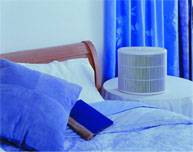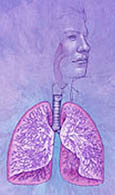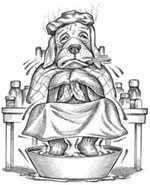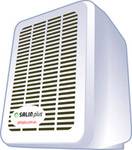Adam Trumble Double Trouble For Australians With Asthma As Winter Damp Takes Hold Interview
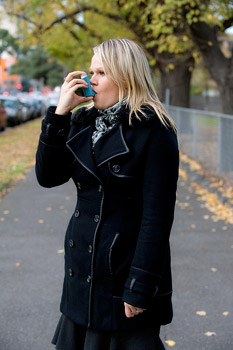
Adam Trumble Double Trouble For Australians With Asthma As Winter Damp Takes Hold Interview
The National Asthma Council today warned Australian households to take measures during winter's cold and damp months to avoid mould, which can trigger asthma symptoms.
Winter is the most humid time for most Australian population centres. Humidity levels above 55% are enough to allow mould to grow.
'High relative humidity is a key ingredient in the growth of mould, and also for house dust mites, with levels around 70% being conducive for both – double trouble for people with asthma," says Associate Professor Sheryl Van Nunen from the Department of Clinical Immunology and Allergy, Royal North Shore Hospital in Sydney.
'Mould in homes can trigger symptoms for many people living with asthma and allergies, as they create spores which are airborne and can be inhaled, while house dust mites are one of the most significant triggers for people with asthma and allergies."
Symptoms for people with asthma may include increased coughing, wheezing, shortness of breath and a greater need for medications.
Partnerships Manager for the National Asthma Council, Adam Trumble said that it is important not to let mould grow unchecked in your home.
'You can have a clean house but still have problems with mould. It can grow in places we don't even think to look - walls, clothes, books, toys and even CDs.
'Home heating will reduce relative humidity, as will dehumidifiers and good ventilation."
A very popular form of home heating in Australia is unducted gas heating. Although these may heat well, they are not recommended for people with asthma or other respiratory issues due to the release of gases such as formaldehyde, carbon monoxide and nitrogen dioxide, which can be dangerous. Ducting these outside makes gas an effective and safe heating option. Well-sealed and highly heated homes may even become too dry in which case a suitable humidifier might help.
Mould is commonly found in bathrooms, bedrooms with en-suite bathrooms and places with poor air circulation such as wardrobes.
Measures that may reduce mould exposure include:
removing visible mould by cleaning with naturally fermented white vinegar solution (mould is not always visible and some porous surfaces may need to be removed and discarded)
using high-efficiency air filters that may be integrated in air-conditioning, heat-recovery ventilation systems, or in stand-along air purifiers
ensuring adequate natural ventilation including the use of extractor fans
sealing leaks in bathrooms and roofs
clearing overflowing gutters and blocked under floor vents
removing indoor pot plants (which promote mould growth)
drying or removing wet carpets
treating rising damp as soon as it is detected
avoiding the use of organic mulches and compost heaps.
National Asthma Council's Sensitive Choice program has approved a number of climate control products that can be found at sensitivechoice.com. The Sensitive Choice program helps educate Australians about managing their asthma and allergy triggers and also encourages companies to recognise the health concerns of people with asthma or allergies. Some manufacturers have even been inspired to develop specific new products, such as carpets, for this community.
Winter is the most humid time for most Australian population centres. Humidity levels above 55% are enough to allow mould to grow.
'High relative humidity is a key ingredient in the growth of mould, and also for house dust mites, with levels around 70% being conducive for both – double trouble for people with asthma," says Associate Professor Sheryl Van Nunen from the Department of Clinical Immunology and Allergy, Royal North Shore Hospital in Sydney.
'Mould in homes can trigger symptoms for many people living with asthma and allergies, as they create spores which are airborne and can be inhaled, while house dust mites are one of the most significant triggers for people with asthma and allergies."
Symptoms for people with asthma may include increased coughing, wheezing, shortness of breath and a greater need for medications.
Partnerships Manager for the National Asthma Council, Adam Trumble said that it is important not to let mould grow unchecked in your home.
'You can have a clean house but still have problems with mould. It can grow in places we don't even think to look - walls, clothes, books, toys and even CDs.
'Home heating will reduce relative humidity, as will dehumidifiers and good ventilation."
A very popular form of home heating in Australia is unducted gas heating. Although these may heat well, they are not recommended for people with asthma or other respiratory issues due to the release of gases such as formaldehyde, carbon monoxide and nitrogen dioxide, which can be dangerous. Ducting these outside makes gas an effective and safe heating option. Well-sealed and highly heated homes may even become too dry in which case a suitable humidifier might help.
Mould is commonly found in bathrooms, bedrooms with en-suite bathrooms and places with poor air circulation such as wardrobes.
Measures that may reduce mould exposure include:
removing visible mould by cleaning with naturally fermented white vinegar solution (mould is not always visible and some porous surfaces may need to be removed and discarded)
using high-efficiency air filters that may be integrated in air-conditioning, heat-recovery ventilation systems, or in stand-along air purifiers
ensuring adequate natural ventilation including the use of extractor fans
sealing leaks in bathrooms and roofs
clearing overflowing gutters and blocked under floor vents
removing indoor pot plants (which promote mould growth)
drying or removing wet carpets
treating rising damp as soon as it is detected
avoiding the use of organic mulches and compost heaps.
National Asthma Council's Sensitive Choice program has approved a number of climate control products that can be found at sensitivechoice.com. The Sensitive Choice program helps educate Australians about managing their asthma and allergy triggers and also encourages companies to recognise the health concerns of people with asthma or allergies. Some manufacturers have even been inspired to develop specific new products, such as carpets, for this community.
Interview with Adam Trumble; Partnerships Manager for the National Asthma Council
Question: What measures do we need to take during the winter regarding asthma?
Adam Trumble: The National Asthma Council recommends the following for Winter:
Get your lungs checked " See your doctor for an asthma check-up before the cold and flu season sets in. Your doctor can check the health of your lungs and decide if you need to change your asthma medicines so you stay well over winter.
Follow your asthma action plan " Together with your doctor, develop or update your personal written asthma action plan with instructions on how to manage your asthma over winter. This asthma plan can also be stored on the Asthma Buddy app which ensures you can act quickly wherever you are to prevent a mild flare-up from turning into a serious one.
Protect yourself " Keep warm if cold air triggers your asthma. Avoid contact with anyone who is sick and control germs by washing your hands regularly. If you haven't already had a flu vaccination ask your doctor about it.
Use your medicines wisely " Tell your doctor if you have been using your reliever puffer more than two days a week or are having asthma symptoms at night. These are important signs that your lungs may not be in the best condition for winter colds and flu. If you have been prescribed a preventer medicine make sure you use it - even if you feel well.
Take extra care if you are over 65 " Colds and flu can hit extra hard in seniors with asthma so ask your doctor about flu and/or pneumonia vaccinations. Make sure you're taking your medicines the best way - ask your pharmacist or nurse to check you're using your puffer or inhaler device correctly.
Question: How does mould in the home affect asthma?
Adam Trumble: Exposure to indoor and outdoor areas that are damp and have mould can trigger asthma symptoms in some people. Mould is commonly found in bathrooms and fridges. It's also found in places with little air circulation such as walk-in and built-in wardrobes, and in bedrooms with en suite bathrooms.
Question: How can we prevent mould occurring in the cold and damp months?
Adam Trumble: Measures that may reduce mould exposure include:
using high-efficiency air filters these may be integrated in air-conditioning, heat-recovery ventilation systems, or in stand-alone air purifiers
ensuring adequate natural ventilation including the use of extractor fans
sealing leaks in bathrooms and roofs
clearing overflowing gutters and blocked under floor vents
removing indoor pot plants (which promote mould growth)
drying or removing wet carpets
treating rising damp as soon as it is detected
avoiding the use of organic mulches, and compost heaps
Question: If mould does occur, how is best to eliminate the issue?
Adam Trumble: Remove visible mould by cleaning with naturally fermented white vinegar solution (mould is not always visible and some porous surfaces may need to be removed and discarded).
Question: What type of heating is best for those with asthma and why?
Adam Trumble: If installing a new air conditioning, heating or ventilation system, consider choosing one that filters the air. It is also important to insulate your home properly - as well as ceiling insulation, don't forget wall and floor insulation. Replace any unflued gas heaters which can increase asthma symptoms, and make sure any wood fire heaters or open fireplaces have chimneys that are working properly so smoke doesn't drift into the room.
Question: If a preferred heating option is not available what is the next best step?
Adam Trumble: There are multiple options which are suitable. Head to www.sensitivechoice.com for information on Sensitive Choice approved products.
Question: What are the benefits of air purifiers and filters?
Adam Trumble: Air purifiers can be effective in removing allergens and irritants from the air. These allergens and irritants can be broken into two broad categories:
Particulate matter – particles include pollen, pet dander, mould spores and dust mite allergens.
Smoke, gasses and volatile organic compounds (VOCs) – including pollution and fragrances.
There are a number of different technologies utilised, but most purifiers include an electrically powered machine that sucks air in, removes or neutralises contaminants and emits cleaner air.
Question: What symptoms should we be looking for regarding asthma in young children?
Adam Trumble: Asthma is a disease of the airways, the small tubes which carry air in and out of the lungs. Children with asthma have sensitive or 'twitchy" airways.
When exposed to certain asthma triggers (such as cold air, exercise, pollen and viruses) the sensitive airways react. They can become red and swollen (inflamed) which causes the airways muscles to tighten and produce excess mucus (phlegm). This makes the airways narrow and difficult for a person to breathe.
Common asthma symptoms include shortness of breath, wheezing, coughing, and a feeling of tightness in the chest.
Question: Which season is most dangerous for Australians with asthma?
Adam Trumble: While this will differ for individuals, winter and back to school after the summer break are both times where a spike in asthma symptoms occurs.
Interview by Brooke Hunter
Adam Trumble: The National Asthma Council recommends the following for Winter:
Get your lungs checked " See your doctor for an asthma check-up before the cold and flu season sets in. Your doctor can check the health of your lungs and decide if you need to change your asthma medicines so you stay well over winter.
Follow your asthma action plan " Together with your doctor, develop or update your personal written asthma action plan with instructions on how to manage your asthma over winter. This asthma plan can also be stored on the Asthma Buddy app which ensures you can act quickly wherever you are to prevent a mild flare-up from turning into a serious one.
Protect yourself " Keep warm if cold air triggers your asthma. Avoid contact with anyone who is sick and control germs by washing your hands regularly. If you haven't already had a flu vaccination ask your doctor about it.
Use your medicines wisely " Tell your doctor if you have been using your reliever puffer more than two days a week or are having asthma symptoms at night. These are important signs that your lungs may not be in the best condition for winter colds and flu. If you have been prescribed a preventer medicine make sure you use it - even if you feel well.
Take extra care if you are over 65 " Colds and flu can hit extra hard in seniors with asthma so ask your doctor about flu and/or pneumonia vaccinations. Make sure you're taking your medicines the best way - ask your pharmacist or nurse to check you're using your puffer or inhaler device correctly.
Question: How does mould in the home affect asthma?
Adam Trumble: Exposure to indoor and outdoor areas that are damp and have mould can trigger asthma symptoms in some people. Mould is commonly found in bathrooms and fridges. It's also found in places with little air circulation such as walk-in and built-in wardrobes, and in bedrooms with en suite bathrooms.
Question: How can we prevent mould occurring in the cold and damp months?
Adam Trumble: Measures that may reduce mould exposure include:
using high-efficiency air filters these may be integrated in air-conditioning, heat-recovery ventilation systems, or in stand-alone air purifiers
ensuring adequate natural ventilation including the use of extractor fans
sealing leaks in bathrooms and roofs
clearing overflowing gutters and blocked under floor vents
removing indoor pot plants (which promote mould growth)
drying or removing wet carpets
treating rising damp as soon as it is detected
avoiding the use of organic mulches, and compost heaps
Question: If mould does occur, how is best to eliminate the issue?
Adam Trumble: Remove visible mould by cleaning with naturally fermented white vinegar solution (mould is not always visible and some porous surfaces may need to be removed and discarded).
Question: What type of heating is best for those with asthma and why?
Adam Trumble: If installing a new air conditioning, heating or ventilation system, consider choosing one that filters the air. It is also important to insulate your home properly - as well as ceiling insulation, don't forget wall and floor insulation. Replace any unflued gas heaters which can increase asthma symptoms, and make sure any wood fire heaters or open fireplaces have chimneys that are working properly so smoke doesn't drift into the room.
Question: If a preferred heating option is not available what is the next best step?
Adam Trumble: There are multiple options which are suitable. Head to www.sensitivechoice.com for information on Sensitive Choice approved products.
Question: What are the benefits of air purifiers and filters?
Adam Trumble: Air purifiers can be effective in removing allergens and irritants from the air. These allergens and irritants can be broken into two broad categories:
Particulate matter – particles include pollen, pet dander, mould spores and dust mite allergens.
Smoke, gasses and volatile organic compounds (VOCs) – including pollution and fragrances.
There are a number of different technologies utilised, but most purifiers include an electrically powered machine that sucks air in, removes or neutralises contaminants and emits cleaner air.
Question: What symptoms should we be looking for regarding asthma in young children?
Adam Trumble: Asthma is a disease of the airways, the small tubes which carry air in and out of the lungs. Children with asthma have sensitive or 'twitchy" airways.
When exposed to certain asthma triggers (such as cold air, exercise, pollen and viruses) the sensitive airways react. They can become red and swollen (inflamed) which causes the airways muscles to tighten and produce excess mucus (phlegm). This makes the airways narrow and difficult for a person to breathe.
Common asthma symptoms include shortness of breath, wheezing, coughing, and a feeling of tightness in the chest.
Question: Which season is most dangerous for Australians with asthma?
Adam Trumble: While this will differ for individuals, winter and back to school after the summer break are both times where a spike in asthma symptoms occurs.
Interview by Brooke Hunter
Have You Seen This?
MORE




